
Conditions of and surgery causing decreased gastric acid correlate with small intestinal bacterial overgrowth (SIBO) diagnosis by culture, a recent study has shown.
Of the 76 patients included, 37 had SIBO (68 percent coliform; 33 percent upper aerodigestive tract [UAT]) and 39 had none. Conditions (p=0.02) and surgery (p<0.01) related to decreased gastric acid were associated with SIBO.
Multinomial logistic regression revealed an association between conditions of decreased acid and UAT SIBO (odds ratio [OR], 5.8, 95 percent confidence interval [CI], 1.4–33.3). Surgery causing decreased acid correlated with UAT (OR, 9.5, 95 percent CI, 1.4–106) and coliform SIBO (OR, 8.4, 95 percent CI, 1.6–86.4). Coliform SIBO was detected in three patients with discontinuous small bowel (OR, 17.4, 95 percent CI, 1.2–2,515).
No differences were observed in complications, overall symptoms, quality of life or psychological traits.
In this study, small bowel aspirates were cultured in patients with suspected SIBO, defined as ≥104 colony-forming units/mL coliform or ≥105 colony-forming units/mL UAT bacteria. The investigators reviewed patient history for risk factors and potential SIBO complications, and evaluated symptoms, quality of life, psychological traits and laboratory values.
Groups were compared by 2-sample t-test, Wilcoxon rank sum test and the Fisher exact test. Analysis of variance F-test, Kruskal-Wallis test, and the Fisher exact tests was conducted to assess overall associations of primary and secondary endpoints with bacterial overgrowth type. Multinomial logistic regression was performed to examine the associations between risk factors and overgrowth type.